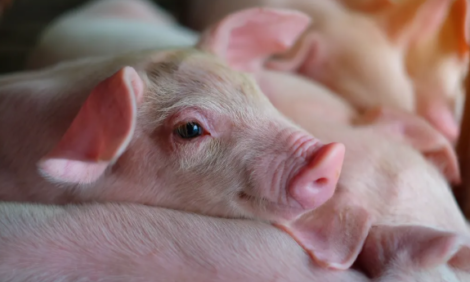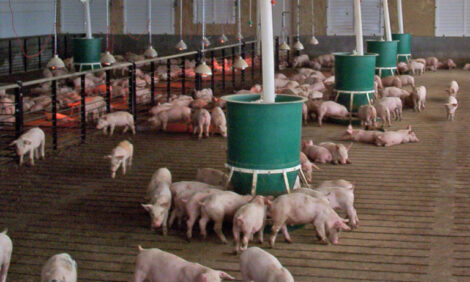



PMWS & PDNS: New Diseases of Pigs
By Livestock Knowledge Transfer, UK - This article looks at these 2 new diseases of pigs and what actions can help control an outbreak.
During 1999 and 2000 there was an upsurge in the incidence of mortality in growing/finishing herds particularly in East Anglia. The main cause of this increase in mortality were two new diseases of pigs, Postweaning Multisystemic Wasting Syndrome, PMWS and Porcine Dermatitis Nephropathy Syndrome or PDNS.
PMWS has been reproduced in laboratories following experimental
infections of pigs with Porcine Circovirus-2 (PCV2). PMWS does not occur in pigs without PCV2 infection. Infection with PCV2 is very widespread but is present in many herds which do not have PMWS or PDNS. Some of the factors involved in the production of PMWS are yet to be discovered. Many researchers believe PCV2 is also involved in causing PDNS.
Post Weaning Multisystemic Wasting Syndrome - PMWS
Clinical signs of PMWS are commonly seen between six and 14 weeks of age. In a herd PMWS often starts quite suddenly and continues to have severe effects for up to 18-24 months. The main clinical signs are wasting/weight loss and failure to thrive. Breathing difficulties and jaundice are sometimes seen. Some pigs, which are in fair or good condition, are found dead. The mortality of pigs from weaning to the grower stage (approximately 30kg liveweight) often averages over 10 percent and in some incidents significantly higher mortality (>30- 40%) occurs.
Porcine Dermatitis Nephropathy Syndrome - PDNS
PDNS commonly occurs between 12 and 14 weeks of age. PDNS starts quite abruptly in a herd. Some incidents are sporadic but in some herds a prolonged outbreak may occur (up to 18-24 months). The main clinical signs of PDNS are wasting/weight loss and failure to thrive associated with nephropathy. Acute joint pain and purple skin blotches which, if extensive, develop into necrotic dermatitis, are also seen. In incidents of PDNS, the mortality of pigs in the grower/finisher stage varies from nil to 14% or more. The case fatality in acutely and severely affected pigs is high (>60-80 %).
Changes in management: Effects on losses
|
No. of recommendations (see over) effectively applied (/20) |
% losses (Weaning to slaughter) |
|||
|
Farm |
Before changes |
After changes |
In the 3 months before changes |
In the 3 months after changes |
|
1 |
8 |
15 |
19.0 |
3.7 |
|
2 |
7 |
19 |
12.0 |
3.0 |
|
3 |
2 |
13 |
21.4 |
10.0 |
|
4 |
7 |
16 |
20.3 |
5.8 |
This table shows the effectiveness of implementing the management changes suggested in the control section as demonstrated on 4 farms in France.
Control of PMWS & PDNS
There is no effective treatment or vaccine for PMWS or PDNS.
Management has been shown to have a major effect on the number of pigs affected and the number of pigs which die. The most important areas in which action is recommended are:-
Farrowing
- All-in / all-out strictly applied
- Empty slurry pit, clean & disinfect between batches
- Wash sows & treat for parasites before farrowing
- Cross-fostering
- Limit to that which is necessary
- Within 24 hours of farrowing only
Post Weaning (up to 30kg liveweight)
- Limit to that which is necessary
- Small pens (<13 pigs) solid partitions
- Empty slurry pit, clean & disinfect, strict all-in / all-out
- Lower stocking density (3 pigs / m2)
- Increased space at the feeder + 7 cm / piglet
- Improved air quality (NH3 < 10ppm, CO2 < 0.15%)
- Improved temperature control
- No mixing of batches
Grower / Finishing (up to 110kg liveweight)
- Small pens, solid partitions
- Empty slurry pit, clean & disinfect, strict all-in / all-out
- No mixing of pigs from the postweaning pens
- No re-mixing between finishing pens
- Reduce stocking density: over 0.75m2 / pig
- Improved air quality & temperature
Others
- Appropriate vaccination programme for other diseases on farm
- Sensible flow within buildings (air, animals, people)
- Strict hygiene (at all times e.g. injections)
- Early removal of sick pigs to hospital room or euthanase
Where management is not changed significantly mortality levels have remained high on farms for 18 to 24 months and up to 3 years.

Source: Livestock Knowledge Transfer - First published 2001. Added to this site 2003.








